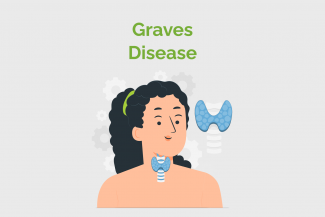
Treatment of Graves' Disease
is aimed at controlling your overactive thyroid. Medicines called beta-blockers are often used to treat symptoms of rapid heart rate, sweating, and anxiety until the hyperthyroidism is controlled.
Hyperthyroidism is treated with one or more of the following:
- Anti-thyroid medications
- Radioactive iodine
- Surgery
If you have had radioactive iodine treatment or surgery, you will need to take replacement thyroid hormones for the rest of your life. This is because these treatments destroy or remove the gland.
Some of the eye problems related to Graves’ disease usually improve when hyperthyroidism is treated with medications, radiation or surgery.
Radioactive iodine can sometimes make eye problems worse. Eye problems are worse in people who smoke, even after the hyperthyroidism is cured.
Sometimes prednisone (a steroid medication that suppresses the immune system) is needed to reduce eye irritation and swelling.
You may need to tape your eyes closed at night to prevent drying. Sunglasses and eye drops may reduce eye irritation. In rare cases, surgery or radiation therapy (different from radioactive iodine) may be needed to prevent further damage to the eye and loss of vision.
Although your condition may seem to go away entirely, you might still need drug therapy to keep your thyroid operating properly. Even if your case of Graves' disease does go into remission and your doctor says it's safe to stop taking medication, you will need to be evaluated every year or so to make sure hyperthyroidism has not returned, since relapse is common.












